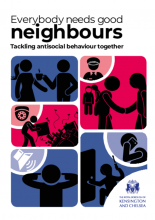Antisocial behaviour can make life unpleasant for our residents and result in an increase in serious crime as well as making our residents fearful in their own communities.
You have a right to feel safe in your own home and everyone deserves to have good neighbours. We encourage all our residents to be tolerant of people's lifestyles and to be conscious of how your own behaviour can affect your neighbours.
Everybody needs good neighbours is information which outlines how we can tackle antisocial behaviour together to make a real difference.
Partnership working
We are committed to tackling antisocial behaviour through early prevention and enforcement. We work with a range of agencies collaborating to achieve common goals more efficiently and effectively.
These agencies include:
- community safety
- environmental health
- community safety serious youth violence
- police
- social services
- mental health team
- community and voluntary agencies
- other registered social providers
Identifying antisocial behaviour
Antisocial behaviour can be anything from :
- harassment and intimidation, including racial harassment
- drugs and substance use
- loud parties
- animal/pet nuisance
- neighbour disputes
- vandalism and graffiti
- physical assault and violent behaviour
Nuisance is not antisocial behaviour
Some nuisances are caused by everyday behaviour that is not intended to harm or annoy anyone. It can still have an impact on the person experiencing it, but it would not be classed as antisocial behaviour. Examples of behaviours which can annoy neighbours, but where it’s unlikely that any legal or enforcement action will be possible:
- day-to-day living noise such as walking around the house, or children playing
- smells from cooking
- one-off loud parties
- parking disputes
- one-off accidental damage to property
- repairing your own vehicle
- short-term building or DIY work
Experiencing nuisance
Being a good neighbour means being tolerant and considerate to different lifestyles, cultures, and needs.
Not everything that disturbs someone is automatically antisocial behaviour. In many cases you can resolve things by discussing the effects of the behaviour with your neighbour. If you do not feel confident, try writing a polite note and putting it through their door. Your Neighbourhood Services Coordinator can provide you with a good neighbour card that might help you with this.
Hate crime
Hate crime is a term used to define a crime that is committed against an individual or group that is motivated by prejudice or hatred towards a particular characteristic.
The five main characteristics are:
- disability
- race or ethnicity
- religion or belief, which includes non-belief
- sexual orientation
- transgender identity
Hate crime is extremely serious and should be reported to the police:
- for emergencies please dial 999
- for non-emergency please telephone 101
We aim to support to residents who are victims of hate crime and will also respond to reports of hate crime within our estates. So please contact using any details in the report to us section and will endeavour to support you with your issue.
Further sources of support and advice
Get free independent support and advice from CATCH- Communities against Hate.

